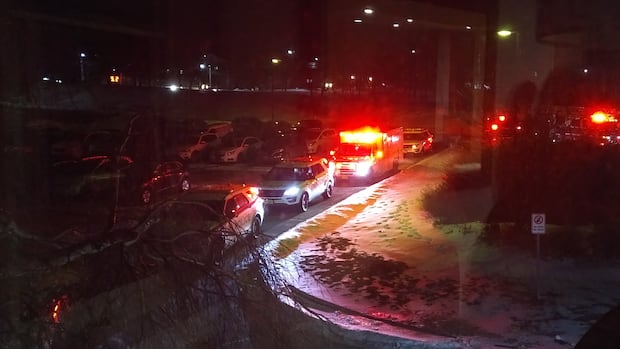Nova Scotia·NewA Halifax man died in February after waiting 40 minutes for a paramedic to respond to a police request for medical assistance. The unions for 911 dispatchers and paramedics say low staffing often contributes to delays. Short staffing, new dispatch system can contribute to delay in arrival of paramedicsFrances Willick · CBC News · Posted: Oct 23, 2025 5:00 AM EDT | Last Updated: 1 hour agoA man died at a condo building on Vimy Avenue in Fairview in February after police were called to the building. (Bryan Ray/CBC)The union representing 911 dispatchers in Nova Scotia says problems getting ambulances to emergency calls — such as the February incident in Halifax in which urgent calls from police failed to result in paramedics’ arrival for 40 minutes — happen all too frequently.Inadequate staffing and training, as well as a new dispatch system that uses outdated maps, mean emergency response is sometimes delayed, the union says.“That process of people calling and then the ambulance not coming happens a lot,” says Jeff Callaghan, the national director of the Canadian Union of Postal Workers, which represents Nova Scotia 911 dispatchers.“It’s only this incident, because there was a SIRT investigation, that it’s come to light like this. This happens very frequently.”Callaghan is referring to a recent report from Nova Scotia’s police watchdog, the Serious Incident Response Team (SIRT), which investigates cases where someone was seriously injured or died in an interaction with police. SIRT report details incidentThe SIRT report says on Feb. 22, police were called to a home in the Fairview neighbourhood of Halifax to respond to a report of a man having a mental health crisis. Police called for medical assistance from Emergency Health Services at 7:41 p.m.According to the SIRT report, EHS told police they were “staging,” which the police interpreted to mean that paramedics were nearby but waiting for the all-clear from police to enter.As the situation between officers and the man escalated, police repeatedly requested help from paramedics, but eventually learned that no one had been assigned to the call.N.S. police watchdog raises concerns about health-care system after man’s deathGroup calls for fatality inquiry in case of Halifax man who died during arrestIt wasn’t until 8:20 p.m. — after a police officer went out and located an EHS supervisor at the Armdale Roundabout — that EHS arrived. That supervisor confirmed that the man was in cardiac arrest, and an ambulance was redirected to travel to the scene, arriving at 8:24 p.m.The man died at the scene.The SIRT report highlighted these delays, noting that a police officer told SIRT investigators they “often have to wait long periods for EHS to arrive,” and that communication between the police and EHS dispatch systems can be “problematic” because they are not located together, due to one being a provincial system and the other being municipal. The report also notes that a new dispatch system with an artificial intelligence (AI) component was in place.’It’s a problem for us’Callaghan said he can’t say for sure what caused the delays on the day in question.But he said the 911 communications centre, which dispatches calls, is sometimes short-staffed.“The staffing shortages over there, it’s a problem for us … making sure there’s enough bodies in the chairs over there to answer calls and dispatch.”Jeff Callaghan is the national director of the Canadian Union of Postal Workers, which represents Nova Scotia 911 dispatchers. (Robert Guertin/CBC)Callaghan said calls sometimes get placed in a queue, or “stacked,” without having an ambulance dispatched, and are then prioritized by dispatchers based on what is perceived as the most urgent situation.“It’s a real problem, the incident that happened in February, and we’re told at our office that what happened then happens all the time. This stacking of calls, calls being dropped, all that kind of stuff. It happens all too frequently.”New dispatching systemA new dispatching system was introduced in January 2025, and Callaghan said staff were not adequately trained to use it, only working on the new system for about a half-hour before it went live.Staff raised concerns about the dated maps it used, some of which were 10 years old and are still in use, Callaghan said.“You can imagine how much growth would happen in a place like Halifax over the last 10 years.”He said sometimes people call and when they give their location, staff can’t find it because it’s not on the maps, or ambulances arrive at a location to discover that they’re not at the right one.“Those things are … still happening,” he said.The company that manages the dispatch system, Emergency Medical Care Inc. (EMC), said in a statement that the maps are updated monthly, and include timely updates for road closures.The system has the capability of using AI to learn system patterns, travel distances and durations, with the potential to recommend deployment of resources, the statement said.Paramedic staffing an issueKevin MacMullin is the business manager of the International Union of Operating Engineers Local 727, which represents Nova Scotia paramedics.Like Callaghan, he said he can’t address the specifics of the Fairview incident because he doesn’t have access to the records.But he confirmed that ambulances are sometimes not dispatched due to low staffing, a high volume of calls, other higher-priority calls, or if ambulances are waiting to offload patients at hospitals.Kevin MacMullin is the business manager of the International Union of Operating Engineers Local 727, which represents Nova Scotia paramedics. (Jeorge Sadi/CBC)MacMullin said delays do sometimes occur in the relay of information between police and EHS dispatching because both systems are busy.“I’m sure there’s probably some way with technology today that we could be able to work around that,” he said. “The communications should be seamless between an officer on scene and any communication centre — ours or theirs — if they need medical assistance or if they need additional officers.”MacMullin added that he feels there should be an investigation into the February incident.EMC, which also manages ambulance services in Nova Scotia, did not make anyone available for an interview.In a statement attributed to Gordon Peckham, EMC’s vice-president of operations, EMC said it is dedicated to improving communication and response processes across all agencies, and the findings of the SIRT report are being reviewed.The company also said more than 120 people have been hired as medical communications officers, paramedics and emergency medical responders since January.MORE TOP STORIESABOUT THE AUTHORFrances Willick is a journalist with CBC Nova Scotia. Please contact her with feedback, story ideas or tips at frances.willick@cbc.ca
It happens all too frequently, says N.S. 911 dispatchers’ union of delayed response times











